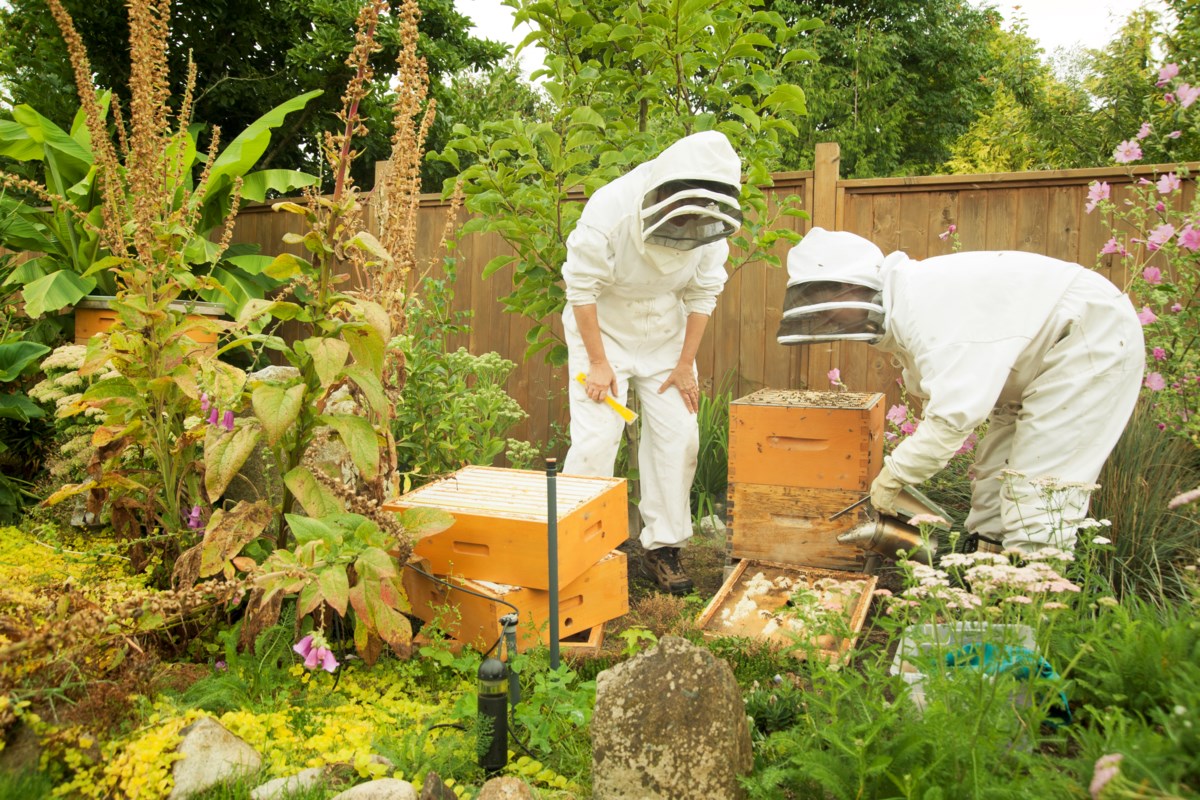Meet Amelia Mraz and Natasha Pham, the founders of Half Mad Honey, an apiary at the Navy Yard in Philadelphia. They use their hives to help people practice both mindfulness and distress tolerance through beekeeping therapy.
Don’t worry, happy bee: “It’s amazing how fear transforms into joy when people come here,” said Amelia Mraz.
“The bees have definitely shown me humility because they can do more than me, and they don’t even have thumbs,” said Natasha Pham.
Even though Amelia Mraz was afraid of bees as a child, when she had to do an elective for her undergraduate degree in psychology at Temple University, she decided to take a beekeeping course in 2016. on the school’s Ambler’s campus.
“I was interested in working with nature, I was not in a good position with my sanity and I took a lot of lectures, so I signed up,” she said.
When the time came to work in the field, and Mraz was standing among the teeming hives, surrounded by thousands of bees, something amazing and unexpected happened.
“It became a space where I felt calm and focused. I didn’t bring any of my other marigolds into the apiary, ”she said. “And I fell in love with bees for how they made me feel.”
Natasha Pham didn’t grow up loving bees either, but when she saw a photo of Mraz in a full beekeeper costume on her OkCupid dating profile in 2019, she also felt some kind of problem.
“I was really interested in meeting someone who is doing something so rare,” she said.
So Pham, a head of a private school, sent a message to Mraz: “I’m looking for local honey.
As they grew to be kind to each other, Mraz showed Pham the ins and outs of beekeeping, and she also began to see the benefits bees brought to her life.
“It’s terrifying but it’s also exhilarating,” said Pham, 37. “And every time I did, I wanted more.”
In May 2020, the University City couple founded Half Mad Honey, a nine-hive apiary at Navy Yard, with the express intention of using their bees for mental health therapy. The name of the company is a nod to the Mad Pride movement, which seeks to de-stigmatize mental illness, and Mad Honey, a type of hallucinogenic honey found in Nepal and Turkey.
“Our honey is not hallucinogenic, so we’re only half-crazy,” Pham said.
Inspired by a program called Heroes to Hives, which teaches veterans beekeeping techniques, as well as alternative practices like horse therapy and music therapy, the beekeeping therapy conducted at Half Mad Honey is considered the first of its kind in the world. .
“I wanted to take therapy out of a clinical office and bring it to the apiary,” said Mraz, 30. “It’s a space where we can practice how to safely activate our alarm response and get back to a quiet place. “
Basically, beekeeping therapy is about putting yourself in a situation that would usually trigger a flight or fight response (Ah! Bees!) These everyday skills.
The therapy sessions are co-facilitated by Mraz, who is pursuing her Masters of Public Health in Social and Behavioral Sciences and Health Communication at Temple, and by Amanda Geraci, a licensed clinical social worker who specializes in trauma treatment. and double diagnoses.
The 90-minute sessions, which are run for groups, couples, and individuals, begin with participants getting ready in beekeeper suits and heading to the apiary. There, Geraci asks her guests to perform a body scan, asking them to relax, take a deep breath, and notice if there is any pain or tension in their body.
“Emotional regulation is really about being mindful of what’s going on with your body and being as present as possible,” Geraci said. “One of the reasons we’re doing this is to really reduce the alarm response and increase our calm response… so the bees are less alarmed.”
According to Mraz, bees communicate through smell and can detect when an animal is stressed through its pheromones, which can make them more likely to sting.
“So it’s important to be mindful in life in stressful situations, but in the apiary it’s really important for us to be mindful so that we can work with the bees,” she said.
Standing among tens of thousands of bees, participants should also be aware of their reactions and not just run over the bees out of instinct.
“Part of mindfulness and distress tolerance is learning to be, literally, with what’s going on around you and slow down your reactions so the bees know you are not a threat,” Geraci said. “When we pay more attention, we have more control over our behavior. “
Participants can hold honeycomb frames, watch the bees do their work, and try to identify the queen. And when the season is right, Pham and Mraz will give their guests a spoon to try the honey straight from the comb.
Although their main focus is apiary therapy, Pham and Mraz sell their honey (they brought in over £ 300 this year) and they organize tours of their apiary, which are open to children from the age of 5. , with Nicole Rivera Hartery de Bees on Rue Principale
The apiary is located in a secret location in the Navy Yard to prevent the theft of hives, but although they are difficult to find, the hives in Half Mad were vandalized earlier this year.
“They were stupid enough to throw a mace at a beehive, but the hive attacked them and they couldn’t take their mace with them,” Pham said. “You can’t sit in a beehive and feel superior. “
Fortunately, the bees survived and Pham and Mraz were able to purchase new beehive boxes thanks to a fundraiser hosted by a friend.
Today, Half Mad Honey is still a part-time labor of love for the couple – Pham remains a private school principal and Mraz works at a nonprofit that evaluates mental health services in County of Montgomery – but their goal is to make Half Mad Honey a nonprofit. , so that even more people can discover what the bees have taught them.
“The bees taught me confidence, self-confidence and trust in the world around me,” Mraz said. “And they taught me not to give up, definitely.”
Sustainable honey for food and forests: the story of a beekeeper
© 2021 The Philadelphia Inquirer
Distributed by Tribune Content Agency, LLC.
Quote:
Using Live Bees for Mental Health Therapy (2021, October 8)
retrieved October 9, 2021
from https://medicalxpress.com/news/2021-10-bees-mental-health-therapy.html
This document is subject to copyright. Apart from any fair use for study or private research, no
part may be reproduced without written permission. The content is provided for information only.
 Xoven Agricultor
Xoven Agricultor



